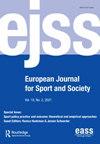Snowpark users’ multi-faceted relationship with risk
IF 2.8
Q2 HOSPITALITY, LEISURE, SPORT & TOURISM
引用次数: 0
Abstract
Abstract A majority of snow sports enthusiasts now use snowparks, even if only occasionally. Epidemiological studies highlight the high probability of accidents occurring at these facilities, compared to traditional pistes. We sought to understand why and how snowparks users tackle such dangers. The representations and behaviours adopted by riders were identified using a questionnaire-based survey, developed after an initial phase of qualitative research. Age and level of expertise are the two main criteria around which the specificities of snowparks users’ relationship with risk are organised. With a few rare exceptions, every expert freestyler has sustained an injury of some severity. At the same time, expert freestylers engage in a process of ‘denial’ regarding the dangers involved in their sport. However, expert freestylers are not simply reckless. Indeed, their relationship with risk appears to be highly calculated, judging from the various behaviours they adopt to minimise the risk of an accident occurring. Helmet wearing is the only risk management behaviour that is adopted less frequently as the individual level of ability increases. Such an attitude allows experts to test their own capacity for judgement and independent thought, while also demonstrating it to others. Thus, the relationship experts have with risk is shaped to a degree by their desire to feel part of a community and stand out from the crowd. The benefits expected from flirting with danger are the greatest and the most diverse among younger individuals. For these individuals, taking risks is a quest to find themselves and their limits and thus forge an identity.《Snowpark》用户与风险的多重关系
现在大多数雪上运动爱好者都会去雪上公园,即使只是偶尔。流行病学研究强调,与传统滑雪道相比,这些设施发生事故的概率很高。我们试图了解滑雪场的用户为什么以及如何应对这些危险。通过一项基于问卷的调查,确定了骑手所采用的表征和行为,该调查是在定性研究的初始阶段之后开发的。年龄和专业水平是滑雪场用户与风险关系的两个主要标准。除了少数例外,每个自由泳高手都有过某种程度的严重受伤。与此同时,专业的自由泳运动员会“否认”他们的运动所涉及的危险。然而,专业的自由泳运动员并不是简单的鲁莽。事实上,他们与风险的关系似乎是经过高度计算的,从他们采取的各种行为来判断,以尽量减少事故发生的风险。随着个人能力水平的提高,佩戴头盔是唯一一种被较少采用的风险管理行为。这种态度可以让专家测试自己的判断能力和独立思考能力,同时也可以向他人展示。因此,专家与风险的关系在一定程度上是由他们渴望成为社区的一部分并从人群中脱颖而出的愿望所塑造的。在年轻的个体中,与危险调情的好处是最大的,也是最多样化的。对这些人来说,冒险是一种寻找自我和极限的探索,从而形成一种身份。
本文章由计算机程序翻译,如有差异,请以英文原文为准。
求助全文
约1分钟内获得全文
求助全文
来源期刊

European Journal for Sport and Society
HOSPITALITY, LEISURE, SPORT & TOURISM-
CiteScore
3.30
自引率
4.20%
发文量
17
 求助内容:
求助内容: 应助结果提醒方式:
应助结果提醒方式:


